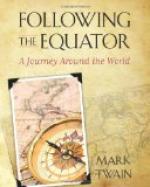The cyanide process was new to me, and full of interest; and among the costly and elaborate mining machinery there were fine things which were new to me, but I was already familiar with the rest of the details of the gold-mining industry. I had been a gold miner myself, in my day, and knew substantially everything that those people knew about it, except how to make money at it. But I learned a good deal about the Boers there, and that was a fresh subject. What I heard there was afterwards repeated to me in other parts of South Africa. Summed up—according to the information thus gained—this is the Boer:
He is deeply religious, profoundly ignorant, dull, obstinate, bigoted, uncleanly in his habits, hospitable, honest in his dealings with the whites, a hard master to his black servant, lazy, a good shot, good horseman, addicted to the chase, a lover of political independence, a good husband and father, not fond of herding together in towns, but liking the seclusion and remoteness and solitude and empty vastness and silence of the veldt; a man of a mighty appetite, and not delicate about what he appeases it with—well-satisfied with pork and Indian corn and biltong, requiring only that the quantity shall not be stinted; willing to ride a long journey to take a hand in a rude all-night dance interspersed with vigorous feeding and boisterous jollity, but ready to ride twice as far for a prayer-meeting; proud of his Dutch and Huguenot origin and its religious and military history; proud of his race’s achievements in South Africa, its bold plunges into hostile and uncharted deserts in search of free solitudes unvexed by the pestering and detested English, also its victories over the natives and the British; proudest of all, of the direct and effusive personal interest which the Deity has always taken in its affairs. He cannot read, he cannot write; he has one or two newspapers, but he is, apparently, not aware of it; until latterly he had no schools, and taught his children nothing, news is a term which has no meaning to him, and the thing itself he cares nothing about. He hates to be taxed and resents it. He has stood stock still in South Africa for two centuries and a half, and would like to stand still till the end of time, for he has no sympathy with Uitlander notions of progress. He is hungry to be rich, for he is human; but his preference has been for riches in cattle, not in fine clothes and fine houses and gold and diamonds. The gold and the diamonds have brought the godless stranger within his gates, also contamination and broken repose, and he wishes that they had never been discovered.
I think that the bulk of those details can be found in Olive Schreiner’s books, and she would not be accused of sketching the Boer’s portrait with an unfair hand.
Now what would you expect from that unpromising material? What ought you to expect from it? Laws inimical to religious liberty? Yes. Laws denying, representation and suffrage to the intruder? Yes. Laws unfriendly to educational institutions? Yes. Laws obstructive of gold production? Yes. Discouragement of railway expansion? Yes. Laws heavily taxing the intruder and overlooking the Boer? Yes.




